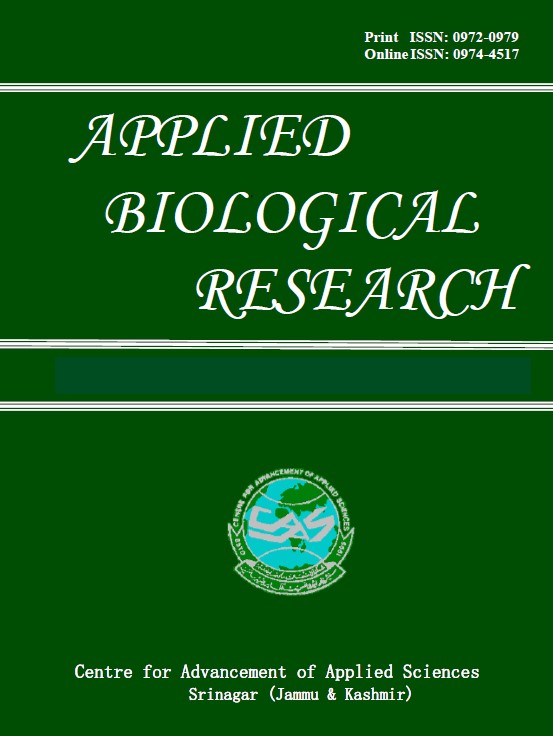ANTIDIABETIC POTENTIAL OF PLANT-BASED SILVER NANOPARTICLES SYNTHESIZED BY USING THE EXTRACTS OF Moringa oleifera, Abelmoschus esculentus and Catharanthus roseus
DOI:
https://doi.org/10.48165/abr.2025.27.01.38Keywords:
Diabetes, drumstick, green synthesis, okra, periwinkle, silver nanoparticlesAbstract
Diabetes mellitus is an endocrine disorder caused by inadequate insulin or insulin resistance, leading to elevated blood glucose levels. This study aimed to evaluate the anti-diabetic potential of plant-based silver nanoparticles (AgNPs). AgNPs from drumstick (Moringa oleifera), okra (Abelmoschus esculentus), and periwinkle (Catharanthus roseus) were synthesized using a green synthesis approach. Characterization of the plant-based AgNPs was carried out using UV-visible spectroscopy, Fourier transform infrared spectroscopy (FTIR), and field emission scanning electron microscopy (FESEM).UV-visible spectroscopy revealed surface plasmon resonance peaks at 400 nm for M. oleifera-AgNPs (MO-AgNPs) and 401 nm for both C. roseus-AgNPs (CR-AgNPs) and A. esculentus-AgNPs (AE-AgNPs). FTIR analysis identified various functional groups present in the AgNPs. FESEM images showed spherical nanoparticles sized 12–22 nm (AE-AgNPs), 21–46 nm (CR-AgNPs), and 13–49 nm (MO-AgNPs). Dynamic light scattering (DLS) analysis indicated maximum size distributions at 50 nm (CR-AgNPs), 70 nm (AE-AgNPs), and 40 nm (MO-AgNPs).The plant-based AgNPs exhibited significant anti-diabetic activity against carbohydrate-digesting enzymes such as amylase and glucosidase. All three synthesized AgNPs increased α-amylase and α-glucosidase enzyme inhibition. The D-glucose diffusion retardation index (GDRI) of AE-AgNPs and MO-AgNPs was comparable to the standard anti-diabetic drug, acarbose. Thus, these plant-based AgNPs demonstrate promising anti-diabetic potential and may be further explored for use in diabetes-related medicinal formulations.
Downloads
References
Agarwal, H., Kumar, S. V., & Rajeshkumar, S. (2018). Antidiabetic effect of silver nanoparticles synthesized using lemongrass (Cymbopogon citratus) through conventional heating and microwave irradiation approach. The Journal of Microbiology, Biotechnology and Food Sciences, 7(4), 371–376.
Aligita, W., Muhsinin, S., Susilawati, E., Pratiwi, D. S., Aprilliani, D., Artarini, A., et al. (2019). Antidiabetic activity of okra (Abelmoschus esculentus L.) fruit extract. Rasayan Journal of Chemistry, 12(1), 157–167.
Bala, N., Saha, S., Chakraborty, M., Maiti, M., Das, S., Basu, R., et al. (2015). Green synthesis of zinc oxide nanoparticles using Hibiscus subdariffa leaf extract: Effect of temperature on synthesis, antibacterial activity and anti-diabetic activity. RSC Advances, 5(7), 4993–5003.
Balan, K., Qing, W., Wang, Y., Liu, X., Palvannan, T., Wang, Y., et al. (2016). Antidiabetic activity of silver nanoparticles from green synthesis using Lonicera japonica leaf extract. RSC Advances, 6(46), 40162–40168.
Dubey, P., & Mishra, S. (2017). A review on diabetes and okra (Abelmoschus esculentus). Journal of Medicinal Plants Studies, 5(3), 23–26.
Kavishankar, G. B., Lakshmidevi, N., Murthy, S. M., Prakash, H. S., & Niranjana, S. R. (2011). Diabetes and medicinal plants – A review. International Journal of Pharmaceutical and Biomedical Science, 2(3), 65–80.
Mehta, S. R., Kashyap, A. S., & Das, S. (2009). Diabetes mellitus in India: The modern scourge. Medical Journal of Armed Forces India, 65(1), 50–54.
Naderi-Samani, E., Razavi, R. S., Nekouee, K., & Naderi-Samani, H. (2023). Synthesis of silver nanoparticles for use in conductive inks by chemical reduction method. Heliyon, 9(10), e20548. https://doi.org/10.1016/j.heliyon.2023.e20548
Ramachandran, V., Arokia Vijaya Anand, M., David, E., Venkatachalam, K., Vijayakumar, S., Sankaran, V., et al. (2019). Antidiabetic activity of gold nanoparticles synthesized using wedelolactone in RIN-5F cell line. Antioxidants, 9(1), 8. https://pubmed.ncbi.nlm.nih.gov/31877697
Rehana, D., Mahendiran, D., Kumar, R. S., & Rahiman, A. K. (2017). In vitro antioxidant and antidiabetic activities of zinc oxide nanoparticles synthesized using different plant extracts. Bioprocess and Biosystems Engineering, 40(6), 943–957.
Sagadevan, S., Vennila, S., Muthukrishnan, L., Gurunathan, K., Oh, W. C., Paiman, S., et al. (2020). Exploring the therapeutic potentials of phyto-mediated silver nanoparticles formed via Calotropis procera root extract. Journal of Experimental Nanoscience, 15(1), 217–231.
Saratale, G. D., Saratale, R. G., Kim, D. S., Kim, D. Y., & Shin, H. S. (2020). Exploiting fruit waste grape pomace for silver nanoparticle synthesis, assessing their antioxidant and antidiabetic potential and antibacterial activity against human pathogens: A novel approach. Nanomaterials, 10(8), 1457. https://doi.org/10.3390/nano10081457
Saratale, R. G., Shin, H. S., Kumar, G., Benelli, G., Kim, D. S., & Saratale, G. D. (2018). Exploiting antidiabetic activity of silver nanoparticles synthesized using Punica granatum leaves and anticancer potential against human liver cancer cells (HepG2). Artificial Cells, Nanomedicine, and Biotechnology, 46(1), 211–222.
Saratale, G. D., Saratale, R. G., Benelli, G., Kumar, G., Pugazhendhi, A., Kim, D. S., et al. (2017). Antidiabetic potential of silver nanoparticles synthesized with Argyreia nervosa leaf extract: High synergistic antibacterial activity with standard antibiotics against foodborne bacteria. Journal of Cluster Science, 28(3), 1709–1727.
Shenoy, R. S., Prashanth, K. H., & Manonmani, H. K. (2018). In vitro antidiabetic effects of isolated triterpene glycoside fraction from Gymnema sylvestre. Alternative Medicine, 2018(1), 7154702. https://pubmed.ncbi.nlm.nih.gov/30158997
Silverstein, R. M., & Bassler, G. C. (1962). Spectrometric identification of organic compounds. Journal of Chemical Education, 39(11), 546. https://doi.org/10.1021/ed039p546
Unnikrishnan, R., Anjana, R. M., & Mohan, V. (2016). Diabetes mellitus and its complications in India. Nature Reviews Endocrinology, 12(6), 357–370.
Yadav, R. N. S., & Agarwala, M. (2011). Phytochemical analysis of some medicinal plants. Journal of Phytology, 3(12), 10–14.

